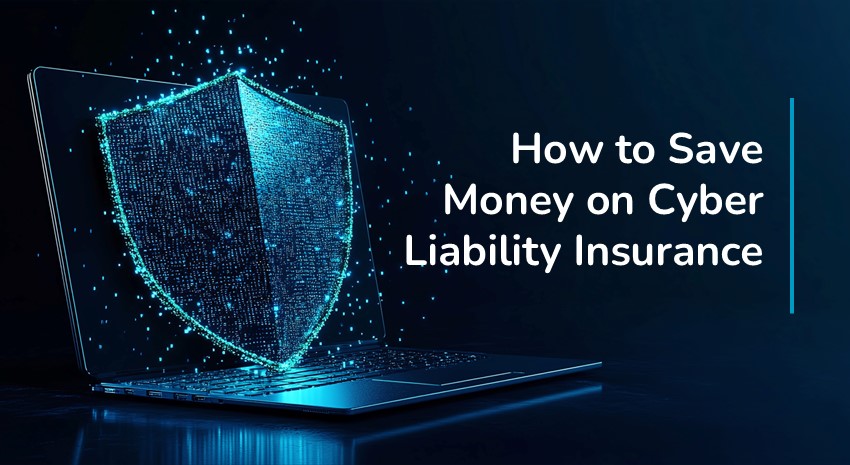Save Money When Shopping for Cyber Liability Insurance

Cybersecurity attacks can devastate a company. Cyber liability insurance provides help for companies that fall victim to a cyberattack.
Types of cyber attacks
Cyber attackers typically target your data, such as personal data on your employees or customers, financial data and account numbers, and company secrets. These criminals usually access sensitive data by acquiring username and password combinations through phishing attacks, brute force methods, or purchasing them on the dark web.
Cybercriminals also infiltrate a company’s business systems with the intent to corrupt the company’s data and demand a ransom before the data can be restored. Ransomware attackers might copy sensitive information and then threaten to release that information unless their ransom demands are met. The disruption caused by these ransomware attacks has caused many companies to close. Even if the company pays the ransom, there is no guarantee that the attackers will restore the data.
Even if the company survives a cyberattack, the damage to the company’s credibility can become a public relations nightmare if the attackers acquire information like medical histories, credit card numbers, Social Security numbers, and other Personally Identifiable Information (PII).
How cyber liability insurance can help
Cyber liability insurance (also called cyber security insurance or simply cyber insurance) helps mitigate the disruption to the business in the aftermath of a cyberattack, keeping the company in business while it tries to recover from a cyberattack. Cyber insurance can perform several important tasks, such as:
- Recover and restore some or all of the lost data, even negotiating with ransomware terrorists on your behalf.
- Perform forensics to determine the cause of the attack (including internal fraud) and provide guidance to correct the failed system security.
- Provide legal assistance to handle any cases brought against the company by customers affected by the attack.
- Communicate with the company’s customers and the general public to inform them about the details of the breach and the steps taken to remediate the problem.
- Provide credit monitoring services in the wake of an attack.
- Help pay a ransom to get your data back—a ransomware attacker might even tell you to call your insurance company and have them negotiate a number.
What you need to know
The increased number and sophistication of cyberattacks on companies large and small has made cyber insurance more expensive and harder to get. Still, it can be a wise investment to protect yourself from a catastrophic loss to a cyberattack. However, you must first demonstrate that you have taken steps to secure your business, including:
Identity access controls – An essential aspect of cybersecurity is ensuring that only the appropriate users can access certain types of information. Access controls help limit the damage a cybercriminal can inflict if they acquire a user’s credentials to gain access to a system or systems. Role-based access controls can also reduce the likelihood of internal fraud by utilizing segregation of duties to prevent a single employee from performing both sides of a transaction, such as entering a client into the system and then authorizing payments to that client.
Multi-factor authentication (MFA) – MFA uses a second form of identification, such as a text message or fingerprint, to authenticate a user. If a username/password combination is compromised, MFA provides an additional step to prevent an attacker from gaining access to the system. Enforcing strong passwords, using biometrics as much as possible, utilizing conditional access policies, and implementing a zero-trust model will also help maintain access security.
Data encryption – Encrypting data between systems helps minimize the impact of data breaches on the company.
Vulnerability assessment – Companies should regularly test for network vulnerabilities before attackers discover them. Maintaining security updates on all software, operating systems, and applications in the company and performing regular assessments can prevent many attacks that exploit known system vulnerabilities from succeeding.
Incident response plan – Companies should have a plan that outlines the steps to follow in the event of a cybersecurity attack. This plan includes escalation procedures, who to contact, and the data to collect during an attack.
Employee training – Employees are often the first line of defense against a cyberattack. Companies should provide employees with regular training on cybersecurity and learn what to look for in the event of an attack.
Implement secure processes – Companies need to establish secure processes to ensure service continuity in the event of an attack. This includes multiple onsite and offsite data backups that can reconstruct their data anytime. Businesses also need to have processes before transferring large amounts of money. Likewise, customers should be advised to confirm any suspicious bills requesting large sums from your company.
ArcherPoint can help you prepare
Cyber insurance can help companies survive a cyberattack with services that would be cost-prohibitive for companies to take on themselves. Moreover, the criteria cyber insurance companies look for are also essential elements any company should take to secure themselves, their employees, their customers, and their systems.
ArcherPoint can help. We offer Managed IT services, including cyber insurance qualification assistance, cybersecurity awareness and training, and vulnerability assessments and recommendations.
Explore our ITMS service plans.
Trending Posts
Stay Informed
Choose Your Preferences
"*required" indicates required fields
